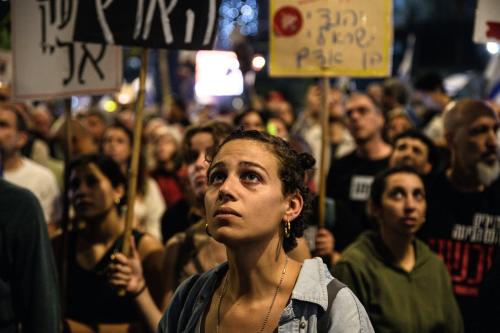Introduction
With the failure of the Camp David negotiations and the outbreak of large-scale violence in October 2000, Israel and the Palestinians have descended into a crisis that threatens to undermine the chances of a peaceful resolution of the conflict for years to come and is taking a heavy toll in human casualties, many of them innocent victims. The two sides have reached an apparent impasse, with violence and retribution supplanting dialogue and negotiation as driving principles of Israeli-Palestinian relations.
The purpose of the Daniel Abraham Israeli- Palestinian Workshop, established in 2002 in Washington, D.C. under the auspices of the Saban Center for Middle East Policy at the Brookings Institution, is to promote dialogue between Israelis, Palestinians, and Americans to generate innovative ideas for ending the violence and returning to negotiations with the aim of reaching a final status agreement to end the conflict. Participants in the workshop include former negotiators, former and current government officials, and policy experts.
The fifth meeting of the workshop, held at the Meridian International Center in Washington, D.C. from May 11-13, 2004, discussed the requirements for a successful Israeli disengagement from the Gaza Strip. The workshop was held amidst great uncertainty following the defeat of Israeli Prime Minister Ariel Sharon’s plan for unilateral disengagement in a Likud referendum. Yet the workshop proceeded on the basic assumption that in one form or the other, the withdrawal will proceed in the near future. The challenge of the withdrawal is to ensure that the Israeli exit allows for orderly transition to a Palestinian government that can eventually exercise control over Gaza and ensure the well-being of its citizens. At the same time, Israel’s unilateral act should be used to generate positive momentum toward restarting the political process and bringing the conflict to a negotiated conclusion. Both objectives will require a robust international role.
To discuss these issues the workshop brought together Palestinians, Israelis, Americans, Canadians, Europeans, Egyptians, and Jordanians for two and a half days of off-the-record discussions. The report that follows summarizes the conclusions of that discussion and the requirements that Israelis, Palestinians, and the international community will need to meet to ensure a successful Israeli withdrawal and the transition to Palestinian independence in Gaza. While it is unreasonable to expect that all of these requirements will be fulfilled in letter and spirit, it is important to understand the symbiotic relationship between them and the reinforcing effect that achieving some of them can have for the greater realization of others. What emerged from these discussions is tantamount to a first blueprint of the requirements for turning Israel’s unilateral disengagement into a successful first step for resolving the Israeli-Palestinian conflict.
We are deeply grateful to Danny Abraham for providing the support which makes these workshops possible and the inspiration to achieve our objective of ending the Israeli-Palestinian conflict.



